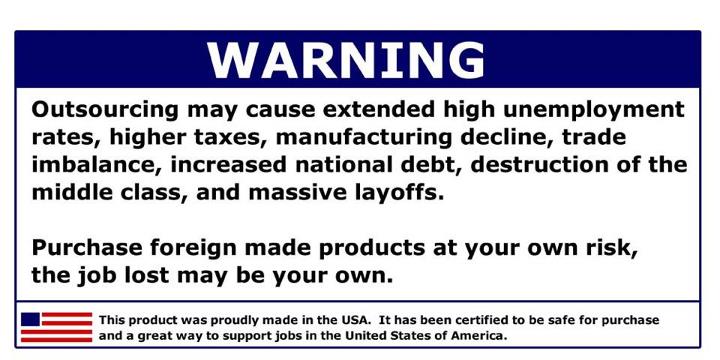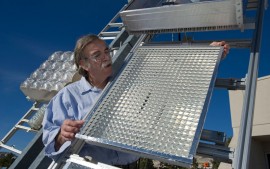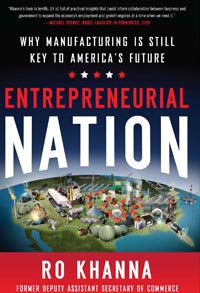September 14, 2012
Times have changed. Even as the “Made in the U.S.A.” label has grown scarce, thanks to the offshore manufacturing in apparel and other industries, it has acquired cachet as a signifier of old-school craftsmanship, even luxury.
The movement has come far enough that Mr. Schiff, a former advertising executive from Miami, believed the time was right to start a Gilt-like shopping site for the Americana set, selling items like shuttle-loom jeans, lace baby dolls and a 19th-century-style baseball made of leather sourced from a Chicago tannery.
“The old ‘Buy American’ is get something lousy and pay more,” said Mr. Schiff, 45. Now “it’s a premium product.”
Style bloggers were among the early adopters. “ ‘Made in U.S.A.’ has gone through a rebranding of sorts,” said Michael Williams, whose popular men’s style blog, A Continuous Lean, has become an online clubhouse for devotees of American-made heritage labels like Red Wing Shoes and Filson.
But the embrace of domestic goods has also moved beyond scruffy D.J. types in Brooklyn who plunk down $275 for a pair of hand-sewn dungarees sewn from Cone denim from the company’s White Oak plant in North Carolina. The adherents now include “urban creatives, high-net-worth individuals, locavores, liberals, conservatives,” said Mr. Williams, who also represents some of these heritage brands as a marketing consultant.
In other words, Americana chic has gone mainstream. Just visit the nearest mall. Club Monaco unveiled a Made in the USA collection last year, in collaboration with Mr. Williams. J. Crew cashes in on Americana chic by selling domestically manufactured Alden shoes, Levi’s Vintage Clothing jeans and Billykirk leather goods. Joseph Abboud’s home page trumpets its collections as “Made in the New America.”
The newfound pride also extends to American cities and smaller communities. Made in Brooklyn is a phenomenon so self-aware, there are stores like By Brooklyn that specialize in products made in the borough. Similarly, an old shoe-polish brand called Shinola has recently been revived to make upscale watches, bicycles and other crafted goods in Detroit and is being promoted as “Made in Detroit.”
And in a survey last year of 1,300 affluent shoppers by Unity Marketing, a Pennsylvania-based consulting and marketing group, respondents ranked the United States first (higher than Italy or France) in perceived manufacturing quality of luxury goods.
Indeed, the “Made in the U.S.A.” label has become chic in the eyes of well-heeled consumers not just in the United States, but also in Asia, said Paulette Garafalo, the president for international, wholesale and manufacturing at Brooks Brothers, which has increased production of shirts, suits and neckwear at its three American factories to meet growing demand. “People want the credibility of an American brand,” she said.
The flight of American factory jobs has even become a heated issue in the presidential race, with President Obama and Mitt Romney trading jabs over being the “Outsourcer in Chief,” to use Mr. Romney’s phrase.
But while American-made goods are now fashionable, few have been willing to stake their professional future on it quite like Mr. Schiff. A former advertising executive at Crispin Porter + Bogusky in Miami, who oversaw the introduction of Coke Zero, he left the firm in April to start Made with two other veterans from the agency, Scott Prindle and John Kieselhorst.
In a sense, they started two companies, which are based in Boulder, Colo.: Made Collection, the flash-sale site, and Made Movement, an advertising agency that represents companies that manufacture only in America. (“If Apple came to us, we’d have to turn them down,” Mr. Schiff said.)
Unlike the typical Buy American sites, which feature crude graphics and a low-budget hodgepodge of pliers and rain boots, Made Collection has the slick yet earthy look of a Madewell campaign. Edie Ure, a former designer for Ralph Lauren and Anthropologie, serves as the site’s curator, and she gives special consideration to design-forward wares that would not be out of place in a Monocle magazine gift guide.
Recent flash-sale items included a knot-back black swimsuit from Cala Ossidiana, a swimwear company based in New York. It sells for $295 and, according to a graphic accompanying each item, supports six American workers. For those with humbler tastes, there was an O.C.E. Hickory work shirt, produced by inmates in the Oregon correctional system as part of its job-training program, for $26.99.
The company grew out of Mr. Schiff’s conviction that a manufacturing revival was crucial to a lasting economic recovery.
Made now counts 26 employees, and with a minimum of publicity, its site has 10,000 members. The ad agency has signed seven clients, including Emeco chairs, a Pennsylvania-based design company whose product sells at Design Within Reach, and New Belgium Brewing, based in Fort Collins, Colo., which brews Fat Tire ale.
Mr. Schiff practices what he preaches. For a recent lunch at the Ace Hotel in Manhattan, he wore Levi’s premium shuttle-loom 501s made in Los Angeles. His tattooed arms poked out of a blue checked shirt by the boutique design house 8.15 August Fifteenth, made in New York City, which he spruced up with a seersucker bow tie by Gitman Bros., made in North Carolina. The only smudge on the stars-and-stripes tableau was his pair of Vans sneakers made in China.
“I would say most days, I’m at about 75 percent,” he said, referring to how much of his outfit is American made. He never wants to become a fanatic, however. “If you become obsessive about it,” he added, “it’s an imposition versus a choice.”
A version of this article appeared in print on September 16, 2012, on page ST16 of t
he Ne
w York edition with the headline: A Label That Has Regained Its Luster.
















